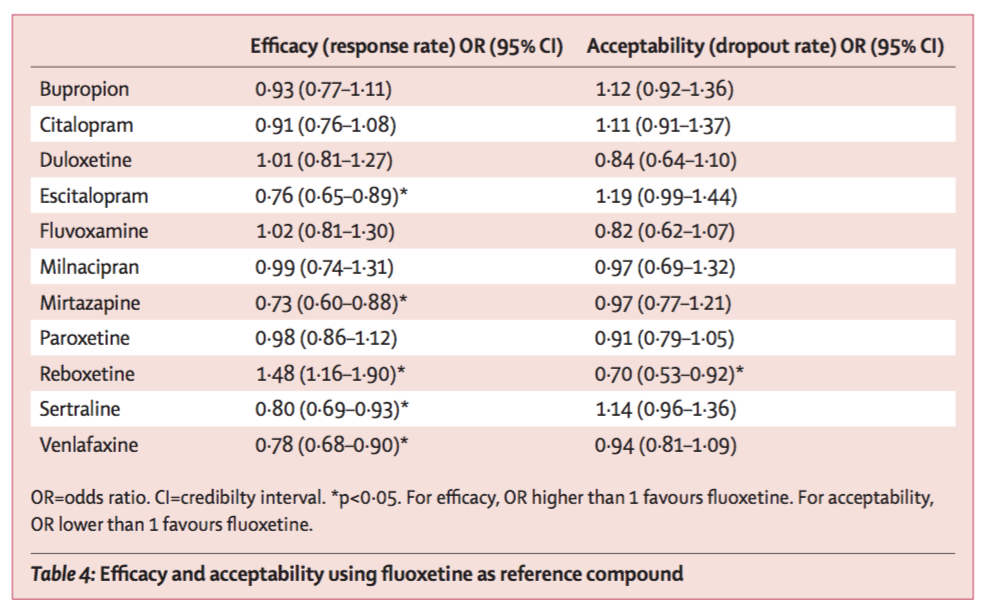Must Reads
Not being able to get a good night of sleep isn't just frustrating, it can be disabling.
When sleep issues become unmanageable – that's when you should turn to sleep aids. Remeron is an effective sleep aid that tends to keep working.
Highlights
- The use of Remeron for sleep is common
- Remeron can be extremely sedating; some people have trouble tolerating next-day sedation
- It's an antidepressant, so it's especially helpful for insomnia + depression
- Major side effects include weight gain and next-day sedation
- Remeron helps with both sleep onset and sleep maintenance
- Unlike benzodiazepines or z-drugs (e.g. Ambien), Remeron is not linked to cognitive impairment
- Remeron works by blocking antihistamine receptors and serotonin (5HT2A) receptors
- Remeron may enhance slow-wave sleep
Why Does Remeron Outperform Other Antidepressants?
Remeron might be the most effective antidepressant. Of the top 12 most prescribed antidepressants, an article in Lancet ranked Remeron #14:
The cumulative probabilities of being among the four most efficacious treatments were: mirtazapine (24·4%), escitalopram (23·7%), venlafaxine (22·3%), sertraline (20·3%), citalopram (3·4%), milnacipran (2·7%), bupropion (2·0%), duloxetine (0·9%), fluvoxamine (0·7%), paroxetine (0·1%), fluoxetine (0·0%), and reboxetine (0·0%). The cumulative probabilities of being among the four best treatments in terms of acceptability were: escitalopram (27·6%), sertraline (21·3%), bupropion (19·3%), citalopram (18·7%), milnacipran (7·1%), mirtazapine (4·4%), fluoxetine (3·4%), venlafaxine (0·9%), duloxetine (0·7%), fluvoxamine (0·4%), paroxetine (0·2%), and reboxetine (0·1%).

Remeron perhaps outperform other antidepressants because it treats both insomnia and depression. Depression itself can be a cause of insomnia. Other effective antidepressants, like SSRIs, tend to exacerbate insomnia.
Sleep-wake dysregulation may be a core feature of depression2. It's unclear which comes first. Does pre-existing insomnia contribute to the development of depression? Or does depression lead the symptom of insomnia?
While it remains unclear, Remeron ranks #1 because it is a dual sleep aid and antidepressant.
The Lancet is basing their antidepressant rankings on the HAMD – the Hamilton Rating Scale for Depression.

Some researchers think that Remeron ranks higher than other antidepressants for artificial reasons. Sleep quality plays a big part in determining the HAMD score. Psychiatrists take sleep quality as an indicator of depression because depressed patients don't sleep well. But if a patient is taking Remeron it might improve sleep quality because it's sedating without improving depressive symptoms.
Since Remeron is a sleep aid, it has an edge over drugs that are pure antidepressants.
Advantages
- No risk of cognitive impairment (may even improve cognition according to some studies3)
- Addictive potential is low
- Tends to decrease anxiety
- Increases BDNF
Disadvantages
- Remeron's slow drug elimination half-life can cause a hangover
- Increases appetite, which may cause weight gain
- Sedating
Remeron improves sleep quality in various ways. It improves sleep architecture (the structure of sleep), and reduces sleep fragmentation.
Remeron helps with both sleep initiation (falling asleep) and sleep maintenance (staying asleep).
Remeron often causes residual sedation the next day due to its long half-life. This sedation can benefit individuals with anxiety. But it is an unwanted side effect if you’re prone to daytime fatigue. Conditions that can cause fatigue include fibromyalgia, depression, hypothyroidism and sleep apnea.
Thus, Remeron is not an ideal antidepressant for atypical depression. Fatigue and excessive sleep are prominent symptoms in atypical depression. Remeron can worsen these symptoms.
Remeron vs. other sleep aids
Other prescription medications used to treat insomnia include:
- Antihistamines, like hydroxyzine
- Benzodiazepines, like Valium
- Z-drugs, like Ambien
- Tricyclic antidepressants, like doxepin
- Atypical antipsychotics, like Seroquel
- Novel drugs like Ramelteon (rozarem) or Belsomra (suvorexant).
Many alternatives to Remeron are linked to worrisome side effects like cognitive impairment. Benzodiazepines and z-drugs both affect the GABA receptor in the brain. Long-term use of these sleep aids can result in protracted cognitive impairment. Because tricyclic antidepressants are anticholinergic, they also tend to hinder memory formation.
Remeron is a good choices for the management of insomnia. Remeron shines in patients suffering from both depression and a sleep disorder. Patients should consult their physician to compare the advantages and disadvantages of sleep medicines.
Remeron vs. Other Sleep Aids
Other prescription medications used to treat insomnia include:
- Antihistamines, like hydroxyzine
- Benzodiazepines, like Valium
- Z-drugs, like Ambien
- Tricyclic antidepressants, like doxepin
- Atypical antipsychotics, like Seroquel
- Novel drugs like Ramelteon (rozarem) or Belsomra (suvorexant).
Many alternatives to Remeron are linked to worrisome side effects like cognitive impairment. Benzodiazepines and z-drugs both affect the GABA receptor in the brain. Long-term use of these sleep aids can result in protracted cognitive impairment. Because tricyclic antidepressants are anticholinergic, they also tend to hinder memory formation.
Remeron is a good choices for the management of insomnia. Remeron shines in patients suffering from both depression and a sleep disorder. Patients should consult their physician to compare the advantages and disadvantages of sleep medicines.
Remeron For Sleep: How Does It Work?
A quick inspection of Remeron's binding affinities gives a clue about why Remeron improves sleep quality and effectively treats insomnia.
| Molecular target | Binding affinity, Ki (nM) |
|---|---|
| 5-HT2A receptor | 69 |
| 5-HT2B receptor | ? |
| 5-HT2C receptor | 39 |
| 5-HT3 receptor | ? |
| 5-HT7 receptor | 265 |
| alpha1-adrenergic receptor | 500 |
| alpha2a-adrenergic receptor | 20 |
| alpha2c-adrenergic receptor | 18 |
| D1 receptor | 4167 |
| D2 receptor | >5454 |
| H1 receptor | 1.6 |
| mACh receptor | 670 |
As can be seen from the above table, Remeron antagonizes (blocks) with high affinity histamine receptors (specifically, the H1 subtype), as well as the serotonin receptor 5HT2A. The potent antihistamine effect of Remeron promotes sleep and results in sedation as a major side effect.
(Since histamine plays a role in maintaining wakefulness, antihistamines like Remeron or Benedryl promote sleep). The serotonin receptor 5HT2A is also thought to play a role in sleep/wake regulation, and 5HT2A blockade likely accounts for Remeron’s tendency to enhance slow wave sleep (SWS).
-
Shibahara H, Ito T, Uematsu N, Imai E, Nishimura D. [Low-dose mirtazapine improved nausea and appetite loss during S-1 therapy]. Gan to kagaku ryoho. Cancer & chemotherapy. 2012; 39(1): 143-5. ↩
-
Nutt D, Wilson S, Paterson L. Sleep disorders as core symptoms of depression. Dialogues in clinical neuroscience. 2008; 10(3): 329-36. ↩
-
Borkowska A, Drozdz W, Ziółkowska-Kochan M, Rybakowski J. Enhancing effect of mirtazapine on cognitive functions associated with prefrontal cortex in patients with recurrent depression. Neuropsychopharmacologia Hungarica : a Magyar Pszichofarmakologiai Egyesulet lapja = official journal of the Hungarian Association of Psychopharmacology. 2007; 9(3): 131-6. ↩
-
Cipriani A, Furukawa TA, Salanti G, et al. Comparative efficacy and acceptability of 12 new-generation antidepressants: a multiple-treatments meta-analysis. Lancet (London, England). 2009; 373(9665): 746-58. ↩
